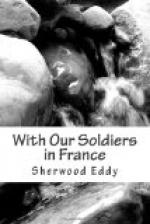Here for three nights we conducted meetings, with five or six hundred men in attendance. More than a hundred men signed the decision cards each night, and when asked it was found that one-third of them had made the decision for the first time, about one-third of them were back-sliders who had been living as Christians before the war but who had gone down before temptation, while the remaining third had been maintaining a consistent Christian life during the war.
In a second after-meeting in the Quiet Room one night, men from almost every quarter of the globe spoke and gave testimony. Here was one poor fellow who had come over after several years in the States. He had had delirium tremens three times, and showed the effects of it on his face. He had formerly been the center of the foul talk and vulgar language of his tent. He had now come straight out for Christ and had boldly witnessed for Him before the men. The second boy, the son of a prominent officer in South Africa, arose under deep emotion. He had been living a wild and reckless life and was known as the “Red Light King.” After his conversion, he went out and brought in another comrade who openly decided for Christ. There were boys from Canada, Australia, and England who followed, many of them with tragedies in their past lives.
It is impossible to calculate the vast influences for good that have been flowing from this hut to the thousands of men who pass through it. The aim of the young Scotch minister who is the leader has been to make it for all the men “a home away from home.” The life in the army, with its irksome toil, daily drill, cold and wet and mud, the horror of battle and the pain of wounds, is all for the moment forgotten as the men enter the place.
We tell the leader that we are taking this building as the model for our new American camps. He says: “Large as this hut is, it is not large enough or good enough for the men. Daily we have need for better equipment. This hut as it stands will serve from two thousand to three thousand men in a day, but nothing is too good for these boys who are coming here to suffer and die in this faraway land. You will send your sons over from America to spend this cold winter on the bleak plains of France in open bell tents. They will be fed on canned goods and corned beef, and they will be housed in the most unattractive towns of France, where there is absolutely no interest or diversion apart from drink and women. You can hardly realize what it means to sit down in a homelike place, to get a hot cup of tea served on a white tablecloth. This is the only home these boys will see in France, and they will either come here or go to the red light resorts. I wish I could tell the men of America what their boys will face here, what they will suffer, what temptations will assail them. The best equipment you can give them is not good enough, for the people at home little realize to what a life their boys are coming, and what hardships will face them here in France.”




